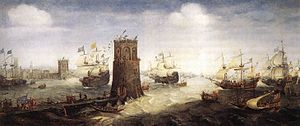
Back الحملة الصليبية الخامسة Arabic الحمله الصليبيه الخامسه ARZ Quinta cruzada AST بئشینجی صلیبی ساواشی AZB Пяты крыжовы паход Byelorussian Пети кръстоносен поход Bulgarian পঞ্চম ক্রুসেড Bengali/Bangla Peti krstaški rat BS Cinquena Croada Catalan Pátá křížová výprava Czech
| Fifth Crusade | |||||||
|---|---|---|---|---|---|---|---|
| Part of the Crusades | |||||||
 The Siege of Damietta | |||||||
| |||||||
| Belligerents | |||||||
|
Crusaders: Levant: Military orders: |
Muslim forces: | ||||||
| Commanders and leaders | |||||||
|
Andrew II of Hungary Leopold VI of Austria John of Brienne Simon III of Saarbrücken Oliver of Paderborn William I of Holland Hugh I of Cyprus Bohemond IV of Antioch Peire de Montagut Hermann of Salza Guérin de Montaigu Aymar de Lairon † Pelagius Galvani Louis I of Bavaria Ulrich II of Passau † |
Al-Adil Al-Kamil Al-Mu'azzam Al-Ashraf Al-Mujahid Shirkuh | ||||||
| Strength | |||||||
| 32,000 men[citation needed] | Unknown | ||||||
| Casualties and losses | |||||||
| Heavy[citation needed] | Unknown | ||||||
The Fifth Crusade (September 1217 - August 29, 1221)[1] was a campaign in a series of Crusades by Western Europeans to reacquire Jerusalem and the rest of the Holy Land by first conquering Egypt, ruled by the powerful Ayyubid sultanate, led by al-Adil, brother of Saladin.
After the failure of the Fourth Crusade, Innocent III again called for a crusade, and began organizing Crusading armies led by Andrew II of Hungary and Leopold VI of Austria, soon to be joined by John of Brienne, titular King of Jerusalem. An initial campaign in late 1217 in Syria was inconclusive, and Andrew departed. A German army led by cleric Oliver of Paderborn, and a mixed army of Dutch, Flemish and Frisian soldiers led by William I of Holland, then joined the Crusade in Acre, with a goal of first conquering Egypt, viewed as the key to Jerusalem. There, cardinal Pelagius Galvani arrived as papal legate and de facto leader of the Crusade, supported by John of Brienne and the masters of the Templars, Hospitallers and Teutonic Knights. Holy Roman Emperor Frederick II, who had taken the cross in 1215, did not participate as promised.
Following the successful siege of Damietta in 1218–1219, the Crusaders occupied the port for two years. Al-Kamil, now sultan of Egypt, offered attractive peace terms, including the restoration of Jerusalem to Christian rule. The sultan was rebuked by Pelagius several times, and the Crusaders marched south towards Cairo in July 1221. En route, they attacked a stronghold of al-Kamil at the battle of Mansurah, but they were defeated and forced to surrender. The terms of surrender included the retreat from Damietta—leaving Egypt altogether—and an eight-year truce. The Fifth Crusade ended in September 1221, a Crusader defeat that failed to achieve its goals.[citation needed]
- ^ "Fifth Crusade (1217-1221)". erenow.org.